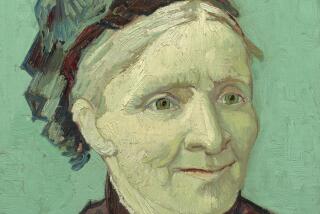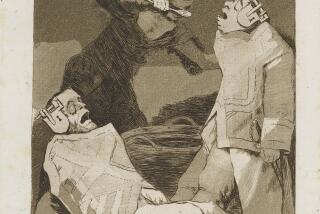Couple’s Artistic Outlook Framed by Life Under Stalin
Ona Dokalskaite and Mykolas Paskevicius of Anaheim were artists on the run the first half of their lives. Their prolific body of work reflects the freedom of expression denied them under Soviet dictatorships.
We sat in the west gallery of the Anaheim Museum as I listened to this engaging couple recall that difficult time. Surrounding us were dozens of their vivid pieces, contemporary but born from those early struggles. They still paint with enthusiasm; Ona is 86, her husband, Mykolas, is 90.
The Anaheim Museum will open an exhibit of their work in its two main galleries on Wednesday. The exhibit is titled “Ona and Mykolas, a Lifetime of Courage and Creativity.” It will run through March 28.
“The spirituality that comes out of these pieces is just amazing,” said Joyce Franklin, the museum’s program director. “These two are so expressive of their inner selves.”
Both agree that their backgrounds have helped instill in them a desire to stretch their creativity with a variety of paintings. Imagine a life of art in which the state tells you what you can paint. . . .
Ona said she was too intimidated to think Mykolas would pay any attention to her when they met in the early 1930s at an Artists’ Union gathering in Minsk, in Belorussia.
“He was from the academy; he was a genius. I was a nobody,” she said.
Mykolas had attended what is now the St. Petersburg Academy of Art. “She was a wonderful artist, and very beautiful,” he said of Ona.
Though in love, both were frustrated in their art careers. State control was so oppressive they could not even sign their own works.
The times were tragic as Stalin directed his terror at anyone creative. Many artists and poets were killed. Ona’s mother was sent to prison in Siberia for the crime of being a schoolteacher. It was five years before Ona saw her again.
Ona and Mykolas, who married in 1933, could survive as artists only by working for the state.
Eventually, Mykolas received the highest honor for an artist in all of the Soviet Union, the Red Banner Badge--almost unheard of for a non-Communist. He even dined at the Kremlin with Stalin.
To celebrate his honor, Ona and Mykolas took a short country holiday with friends. While they were gone, the advancing Germany army burned most of Minsk to the ground. They had no choice but to flee.
For most of the next decade, they were nomads, trying to remain free of either enemy control or new terrors by Stalin. On the run, they would trade their paintings for food, and often medical care.
Ona writes in a book of her artwork: “For wanting to free ourselves from this insanity, guiltless, we became criminals. We were not alone; it seemed everyone was trying to escape by any means available.”
By now they had a baby daughter, Alyza. And Ona’s sister, Birute, an actress, had to flee the country and left them with her own baby daughter, also named Birute. (They raised her as their own.)
They eventually wound up in Ona’s native Lithuania, but freedom for an artist was hardly any better there. With Stalin advancing on its borders, they tried to reach Switzerland. But they wound up in a displaced persons camp in a section of Germany under American jurisdiction.
They lived in that camp for nearly five years. Though conditions were primitive--five of them, counting Ona’s mother, in one room, and sharing a bathroom with other families--Mykolas said it was far better than living in fear.
It wasn’t until 1949, when they finally made it to America, that they found real freedom for their art. Mykolas got work as a graphic designer, by which he made a good living. He built an art studio for Ona at their Long Island home. Eventually, he returned to painting himself. They moved to Southern California in 1982, where their daughters were living.
Both Ona and Mykolas have produced a book of artwork and have developed their own followings. Franklin told me that one collector loves Mykolas so much he has 40 of the artist’s pieces.
I asked Mykolas if he enjoys painting now as much as he did as a younger man.
“What I enjoy,” he said, “is living here. Once you’ve been an artist in Russia, you appreciate the justice and freedom that you have here in America.”
Three years ago, they got a chance to go back to Minsk for an art event. They met some of those from the old Artists’ Union. None of them, they said, fared well as artists by remaining in the Soviet Union.
Ona and Mykolas told me another terrific story. Ona and her sister had each thought the other had failed to survive the terror of the period. But 50 years later, they found each other and had a tearful reunion. And an even greater reunion, Ona said, was mother and daughter.
The Reception: Joyce Franklin learned of Ona and Mykolas through guest curator Faith Toon, who knew their work through Aaron Brothers, the art house. Having two such magnificent artists living right there in Anaheim made it imperative that she convince them to let the museum exhibit their work, Franklin said.
The couple will appear at a reception at the museum from noon to 3 p.m. on Saturday. Their art books are available at $30 each. They will donate all their proceeds to the museum.
Wrap-Up: If you happen to visit the exhibit, you will no doubt be drawn to the small painting of a handsome man posted in the west gallery. The story behind it is awesome.
It’s Ona Dokalskaite’s husband, Mykolas. She painted it 61 years ago; it was about the only thing she was able to pack on their troubling trek to Lithuania. In their attempt to reach Switzerland, again they could take almost nothing with them. But a relative in Lithuania had saved it for her all these years and sent it to her.
“He was so very handsome,” Ona said as she gazed at it, and quickly added, “and still is.”
*
Jerry Hicks’ column appears Tuesday, Thursday and Saturday. Readers may reach Hicks by calling the Times Orange County Edition at (714) 966-7823 or by fax to (714) 966-7711, or e-mail to jerry.hicks@latimes.com
More to Read
The biggest entertainment stories
Get our big stories about Hollywood, film, television, music, arts, culture and more right in your inbox as soon as they publish.
You may occasionally receive promotional content from the Los Angeles Times.










